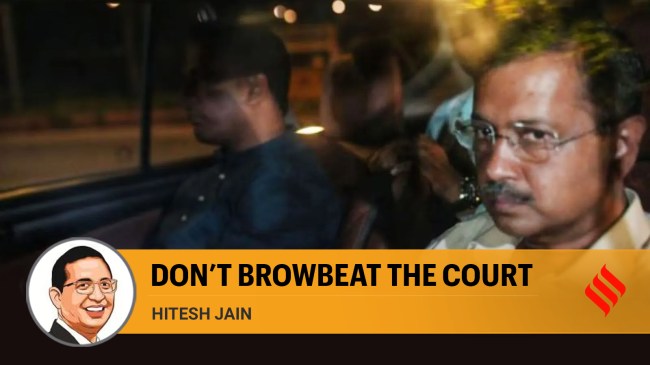Opinion BJP’s Hitesh Jain writes on Kejriwal’s arrest: Don’t browbeat the court
Strategic demonisation of judiciary, investigative agencies by AAP and its allies undermines rule of law.
 Delhi Chief Minister Arvind Kejriwal entering the Enforcement Directorate (ED) office after his arrest. (Express Photo by Abhinav Saha)
Delhi Chief Minister Arvind Kejriwal entering the Enforcement Directorate (ED) office after his arrest. (Express Photo by Abhinav Saha) In a democracy, the judiciary serves as the guardian of the rule of law, ensuring that every citizen, irrespective of their position, is treated equally. This principle, foundational to our democratic fabric, faces unprecedented scrutiny in the wake of recent political controversies, most notably the “liquorgate” scandal involving Arvind Kejriwal and Manish Sisodia, and further exacerbated by the audacious attempts of political figures like Kapil Sibal to influence judicial proceedings.
A recent article by Pratap Bhanu Mehta (‘A chilling moment’, IE, March 23) has stirred the pot by criticising the judiciary’s stance and calling for exceptional treatment of political figures involved in legal battles. This perspective not only undermines the sanctity of the judicial process but also threatens the very principles of democracy by promoting a dangerous precedent of preferential treatment.
The case against Manish Sisodia, which subsequently implicated Arvind Kejriwal, has been the focal point of an intense debate. As it refused to grant bail to Sisodia, the Supreme Court spoke of a meticulously orchestrated scheme. Contrary to the narrative propagated by the Aam Aadmi Party (AAP) and its sympathisers, the evidence as detailed by the court delineates a narrative of calculated deceit and corruption.
Kapil Sibal’s reported attempt to browbeat the Supreme Court judges by insinuating that their legacy would be at stake if they failed to entertain certain petitions under Article 32 of the Constitution is part of a familiar strategy employed by certain political figures. This approach seeks to manipulate judicial outcomes by evoking concern for the court’s historical reputation, undermining judicial impartiality.
Moreover, the narrative pushed by some, including Mehta, that calls for the judiciary to extend beyond its legal mandate to support Kejriwal, is misguided and perilous. It suggests a tyranny of power where laws are bent to serve political ends, thereby eroding trust in the judicial system. Such a stance not only sets a bad precedent but also undermines the judiciary’s independence, suggesting that political status should warrant preferential treatment.
This saga also raises significant questions about the Opposition’s stance, particularly the hypocrisy of the INDI Alliance. The swift transition from accusing Kejriwal of being the “commander-in-chief” of the conspiracy to crying foul over a purported vendetta highlights a troubling pattern of political opportunism that disregards the rule of law for political gain.
The call for the judiciary to sidestep its responsibilities is not only an affront to the principle of equality before the law but also a misunderstanding of the judiciary’s role in a democracy. The legal system’s integrity hinges on its impartiality and its commitment to justice, irrespective of the individuals involved. To suggest that the judiciary should act as an arbiter of political battles, rather than an upholder of the law, is to misunderstand its purpose and threaten the democratic process.
Furthermore, the strategic demonisation of investigative agencies and the judiciary by the AAP and its allies serves as a tactic to undermine the legal process. This, coupled with the relentless vilification of opposing political figures, reveals a disconcerting pattern of governance that leans towards anarchy over order, chaos over governance.
Rule of law must stand paramount, untainted by political affiliations and unswayed by public figures’ status. The judiciary’s role as the arbiter of justice must be preserved, free from external pressures that seek to distort the legal process for political ends. As these cases unfold, they serve as stark reminders of the importance of judicial independence and the dangers of undermining it for political gain. Democracy thrives on the principles of fairness, justice, and equality before the law, and any attempt to compromise these tenets threatens not just the judiciary’s integrity but the democratic fabric of our nation.
The writer is Vice President, Mumbai BJP and managing partner – Parinam Law Associates






